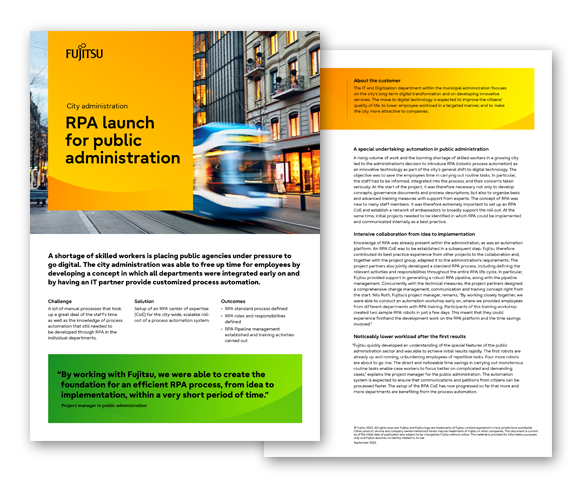A shortage of skilled workers is placing public agencies under pressure to go digital. The city administration was able to free up time for employees by developing a concept in which all departments were integrated early on and by having an IT partner provide customized process automation.
Challenge
A lot of manual processes that took up a great deal of the staff’s time as well as the knowledge of process automation that still needed to be developed through RPA in the individual departments.
Solution
Setup of an RPA center of expertise (CoE) for the city-wide, scalable roll-out of a process automation system.
Outcomes
- RPA standard process defined
- RPA roles and responsibilities defined
- RPA Pipeline management established and training activities carried out
By working with Fujitsu, we were able to create the foundation for an efficient RPA process, from idea to implementation, within a very short period of time.
Project manager in public administration

200
identified process
candidates
- Industry: Public
- Location: Germany

About the customer
The IT and Digitization department within the municipal administration focuses on the city’s long-term digital transformation and on developing innovative services. The move to digital technology is expected to improve the citizen’s quality of life, to lower employee workload in a targeted manner, and to make the city more attractive to companies.
A special undertaking: automation in public administration
A rising volume of work and the looming shortage of skilled workers in a growing city led to the administration’s decision to introduce RPA (robotic process automation) as an innovative technology as part of the city’s general shift to digital technology. The objective was to save the employees time in carrying out routine tasks. In particular, the staff had to be informed, integrated into the process, and their concerns taken seriously. At the start of the project, it was therefore necessary not only to develop concepts, governance documents and process descriptions, but also to organize basic and advanced training measures with support from experts. The concept of RPA was new to many staff members. It was therefore extremely important to set up an RPA CoE and establish a network of ambassadors to broadly support the roll-out. At the same time, initial projects needed to be identified in which RPA could be implemented and communicated internally as a best practice.
Intensive collaboration from idea to implementation
Knowledge of RPA was already present within the administration, as was an automation platform. An RPA CoE was to be established in a subsequent step. Fujitsu therefore contributed its best practice experience from other projects to the collaboration and, together with the project group, adapted it to the administration’s requirements. The project partners also jointly developed a standard RPA process, including defining the relevant activities and responsibilities throughout the entire RPA life cycle. In particular, Fujitsu provided support in generating a robust RPA pipeline, along with the pipeline management. Concurrently with the technical measures, the project partners designed a comprehensive change management, communication and training concept right from the start. Nils Roth, Fujitsu’s project manager, remarks, “By working closely together, we were able to conduct an automation workshop early on, where we provided employees from different departments with RPA training. Participants of this training workshop created two sample RPA robots in just a few days. This meant that they could experience firsthand the development work on the RPA platform and the time savings involved.”
Noticeably lower workload after the first results
“Fujitsu quickly developed an understanding of the special features of the public administration sector and was able to achieve initial results rapidly. The first robots are already up and running, unburdening employees of repetitive tasks. Four more robots are about to go live. The direct and noticeable time savings in carrying out monotonous routine tasks enable case workers to focus better on complicated and demanding cases,” explains the project manager for the public administration. The automation system is expected to ensure that communications and petitions from citizens can be processed faster. The setup of the RPA CoE has now progressed so far that more and more departments are benefiting from the process automation.








